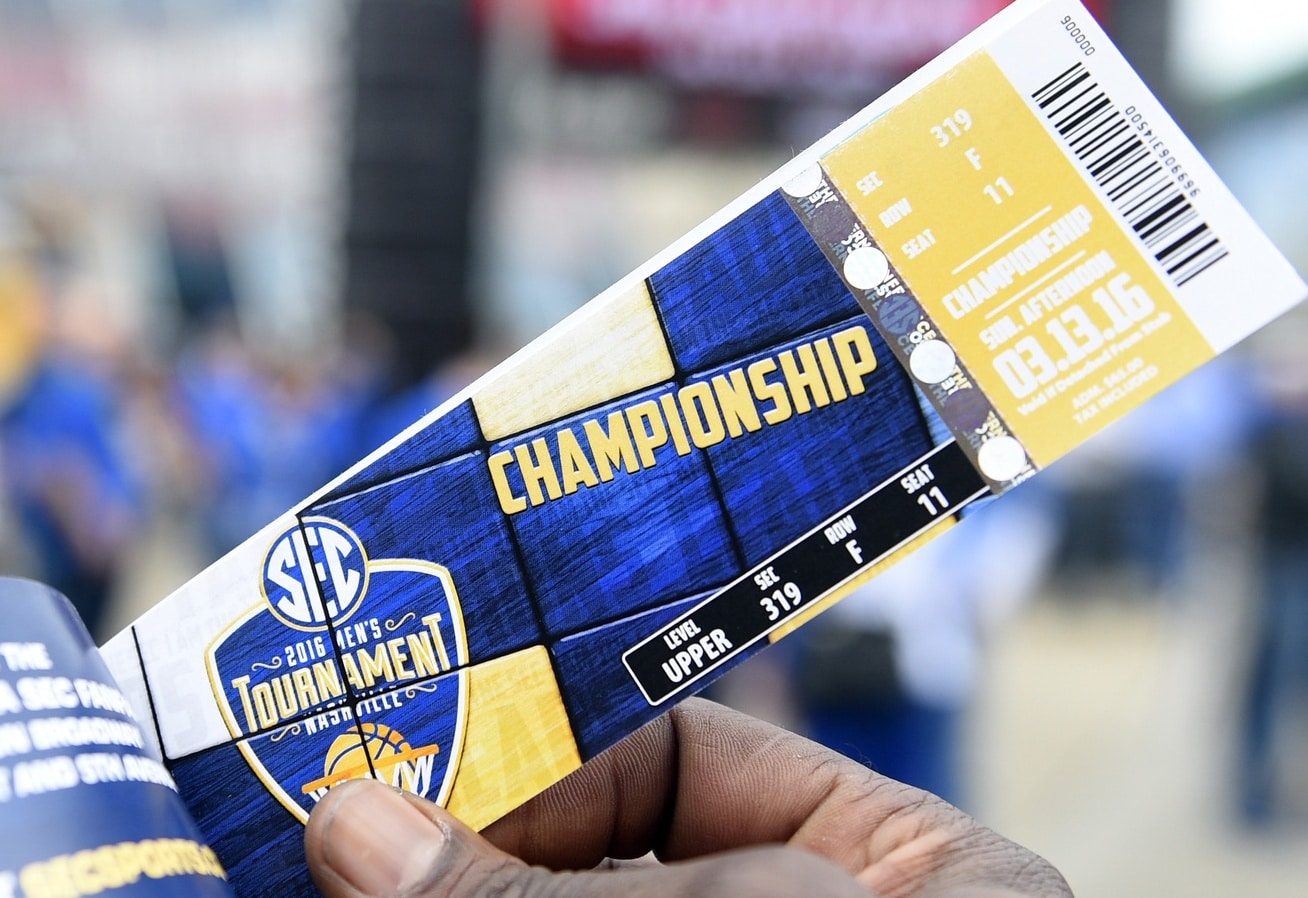
Matt Painter was almost 3 weeks from closing out a Big Ten regular-season title when he took the podium after a loss to Maryland. He admitted something that few Power 5 coaches are willing to actually say on the record.
“I’m not really worried about the Big Ten Tournament — I’m worried about the NCAA Tournament,” Painter said (via The Indianapolis Star). “You don’t get judged on that one — the Big Ten Tournament.”
I mean, is he wrong?
When you think of Painter’s legacy, you don’t think about the fact that he has 1 Big Ten Tournament title and 3 runner-up finishes. You think about the fact that in Year 19 at Purdue, Painter is still trying to reach his first Final Four. That, he knows, is the thing separating him from being considered one of the elite coaches in the sport.
The discussion today isn’t so much about whether the conference tournament carries the same weight as the NCAA Tournament. We know it doesn’t. The question is whether the ACC, Big Ten, Pac-12 and SEC Tournaments still carry value at all, or if they have run its course. After all, Painter isn’t alone in pooh-poohing the idea of conference tournaments.
As conference tournament week kicks into gear at the Power 5 level, we decided to take a coast-to-coast look at whether conference tournaments should stay or go:
Brett Friendlander, Saturday Road — Get rid of conference tournaments
First, a caveat: I love the ACC Tournament.
The first college basketball game I can remember watching as a kid was the 1971 final in which South Carolina’s Kevin Joyce outjumped North Carolina’s Lee Dedmon to set up the winning buzzer-beater by teammate Tom Owens. It’s one of the big reasons I became a Gamecocks fan and decided to go to school in Columbia.
This year’s ACC Tournament will be the 30th that I’ve covered and I still get fired up about being there the moment I walk into the arena, especially when it’s held in Greensboro, as it is this year.
That doesn’t change the fact that the tournament isn’t what it used to be. It’s a change that began when the NCAA expanded its field to 64 teams in 1985, turning all ACC and other conference tournaments into relative formalities whose main purpose is making money, rather than deciding a champion. So, yes, we are a long, long way from the classic 1974 winner-take-all ACC Tournament.
Conference expansion has also watered down the importance and interest in their postseason tournaments.
For most top teams and their coaches, they’ve become a hindrance in their preparation for the tournament that actually means something. The one that crowns a national champion.
Retired UNC coach Roy Williams hated the ACC Tournament so much, he’d publicly deride it as little more than “a giant cocktail party.” And the fans seem to have grown just as tired of it. That’s best illustrated by the aggressiveness with which the ACC has been pushing ticket sales at arenas and on social media for the past few weeks.
Back when the league was a 9-team entity with rivalries that made geographic sense and stoked by a round-robin regular-season schedule that had each team facing each other twice, there was always a waiting list to buy tickets. Now you can walk up to the arena on game day and get them without any trouble.
From the box office, not even from a scalper.
With talk of an expanded NCAA field to as many as 90 teams, it’s time to change with the times and do away with conference tournaments that have outlived their usefulness. No matter how romantic and profitable they might still be.
Jon Gold, Saturday Out West — Keep conference tournaments
If the Pac-12 Tournament were held in Pullman or Corvallis — not to mention Greensboro — I might be against the mere idea of bringing the best, and the worst, the conference has to offer together for a postseason tournament.
But we’re talking Sin City, Glitter Gulch, the City of Second Chances. We’re talking Vegas, baby, Vegas.
Who in their right mind is going to turn down a trip to Las Vegas, whatever the reason? Especially if it gives the Pac-12 a chance at more NCAA Tournament bids, which the conference tournament does, and which the Pac-12 sorely needs?
The days of the Pac-12 being an automatic 5- or 6-bid conference are long gone. Time was, a half-dozen Pac-12 teams could earmark themselves into March Madness months in advance. UCLA and Arizona, of course. Then there was Stanford, Washington, Utah and Cal, which for a while were regularly formidable. Oregon started to put Phil Knight’s money to work at a certain point. And there was Washington State, which boasted Klay Thompson, and Arizona State, which featured James Harden. Even USC and Oregon State — which just 2 years ago made Elite 8 runs — have had special squads.
But, as we learned once more this season, nothing can be taken for granted. UCLA and Arizona are top-2 locks, and USC feels pretty good about its chances. Arizona State needs a semifinal run, if not a championship berth, if not an outright championship itself, to give the conference four bids. The Ducks, Utes, Buffaloes and Huskies are on the outside looking in, and it’s either title or bust for them.
Giving those schools at least a chance at postseason glory is worth it.
You know what else is?
Two-for-one steak specials at the Golden Nugget. You’re really going to try to get me to say that’s not worth it?
Alex Hickey, Saturday Tradition — Keep the conference tournaments
Once, I was a purist.
Conference tournaments were just a way to dilute the meaning of the regular season. The Big Ten, Pac-10 and Ivy League were the conferences that did it right in crowning a true champion without a tourney.
But things change.
As conference expansion made it impossible for the Big Ten to play a true round-robin among all league members, the honesty of a regular-season championship became diluted itself. This isn’t the Big 12, where everybody bites from the same apple. Strength of schedule is a factor in determining the regular-season Big Ten champ.
With that comes a validity in holding a tournament to crown a champion.
Though it seems counterintuitive, I like the concept of a conference tournament far more for power conferences than single-bid leagues.
Conference tournaments in smaller leagues should be considered a violation of the Eighth Amendment, because they can dole out cruel and unusual punishment. Just this week, Eastern Washington saw an 18-game winning streak snapped in the first round of the Big Sky Tournament. Now the Eagles have nothing to show for their great season.
That’s bogus.
In major conference tournaments, the stakes aren’t as dire. Fine by me. Roy Williams once derided the ACC Tournament as a cocktail party. I don’t know how much of a stick-in-the-mud Ol’ Roy is, but cocktail parties are awesome.
Conference tournaments in multi-bid leagues are a way to celebrate the season, the conference, and basketball itself in a communal setting. We’ve made it through winter, people. Damn right there should be a party.
For bubble teams, conference tournaments are an opportunity to grab another quality win or 2 and reach the NCAA Tournament. For teams already securely in the field, it’s a chance to have fun beating a rival. Or maybe even snuffing out its NCAA Tournament hopes.
Major conference tournaments are a bit like non-Playoff bowl games in college football. Are you really going to complain about bonus basketball?
It doesn’t always come with the same do-or-die mentality of the next tournament, but that doesn’t mean conference tournaments can’t be intense.
Who could forget the 6-overtime marathon between Syracuse and UConn at the 2009 Big East Tournament? Neither side gave an inch. And neither side cared about resting up for later in March. Nor did they need to. The Huskies still made the Final Four.
In my case, there’s no forgetting the 2002 Big Ten semifinal between Iowa and Indiana. Former Hoosier Luke Recker sank a jumper at the buzzer to win the game for Steve Alford’s Hawkeyes. In response, I threw my shoe at the TV.
The only problem was I was at my friend’s parents’ house.
I remain banned from their home 21 years later, which seems like an overreaction given how solidly televisions were built back then. Nothing even broke!
But hopefully you see the point. Shoe-throwing is not a regular-season basketball reaction. (Or, to be fair, a regular-person reaction.)
Conference tournaments aren’t the NCAA Tournament. But they are the appetizer that whets our collective appetite for the main course.
Connor O’Gara, Saturday Down South — Get rid of conference tournaments
I want to be on record saying that selfishly, I love conference tournament week. We’ve gotten so far removed from having meaningful sports on during a weekday afternoon that I genuinely look forward to conference tournament week, no matter how significant or insignificant it is. If enjoying Texas A&M and Mizzou play at 1:30 on a Thursday afternoon is wrong, I don’t want to be right.
But that’s my problem. I believe it has lost its value. Once used as a tool to truly crown a champion, now it just feels more like a money grab than a necessary metric for the selection committee.
What about the bubble teams, you ask? We can determine worthy NCAA Tournament teams without conference tournaments. After all, there are bubble teams entering the week and at the conclusion of the week. What about the poor teams on the outside looking in who want a chance at The Big Dance? I don’t know. How about be better November-February?
In the event that the NCAA Tournament field expands and more games will be required to win a national title, it just feels like we can have even better buildup to the NCAA Tournament if conference championships went by the wayside. I’d rather teams get a week off to get healthy than play 3 or 4 games in as many days in an effort to win a secondary title. It would put even more emphasis on winning that regular-season conference crown, too. That’s what college football purists are worried about losing. In an indirect way, college basketball can gain that.
Besides, are we sure it even matters much anymore for the selection committee? The SEC’s conference champ hasn’t earned a 1-seed in the NCAA Tournament since 2015. Last year, Texas A&M was a perceived bubble team that made it to the conference title game as an 8-seed, only to be told it still didn’t have enough quality wins to make the NCAA Tournament. Meanwhile, Tennessee entered that week ranked No. 9 in the AP Poll and won the conference title, only to still end up with a 3-seed.
I realize that there’d be questions about the mid-majors. What would getting rid of conference tournaments do for them? Um, it would help them. For the 1-bid leagues that have a 6-seed win the conference tournament, it gets lost in the madness that their best team spends March at home (or in the NIT) instead of in the NCAA Tournament. I’d argue that the conference tournaments are too high stakes for the mid-majors.
It goes against my desire to flip on the last 2 minutes of the Patriot League Championship and see dreams made or crushed, but if we’re thinking about the future of the sport and not just our own personal entertainment, we really don’t need conference tournaments anymore.
Well, unless everyone gets to go to Vegas like Jon.
Connor O'Gara is the senior national columnist for Saturday Down South. He's a member of the Football Writers Association of America. After spending his entire life living in B1G country, he moved to the South in 2015.







